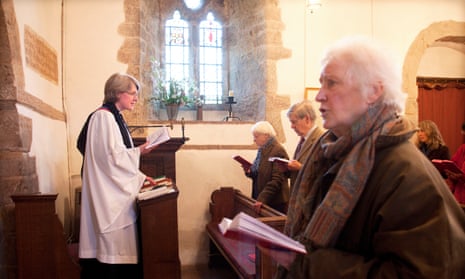The scale of the Church of England’s atrophy has been starkly set out by figures presented to its general assembly that show church attendance will continue to fall for the next 30 years.
Previously, the church predicted that its decline in numbers was likely to continue for another five years before recovering.
But John Spence, the C of E’s finance chief, said on Wednesday that the decline was expected to continue for another three decades, with today’s figures of 18 people per 1,000 regularly attending church falling to 10 per 1,000. An 81-year-old was eight times more likely to attend church than a 21-year-old, he said.
“On all likely measures of success, given the demographics of the church, it is unlikely we will see a net growth in church membership within the next 30 years,” said Spence. “I could have given you other facts, but I think you get the point.”
The figures illustrate the challenge facing a church whose congregations are ageing as the millennial generation increasingly spurns organised religion.
A church source acknowledged that the 30-year prediction was “much gloomier” than previous forecasts. But it did not take into account the potential impact of the C of E’s emphasis on evangelism and its £72m programme of “renewal and reform”, the source added.
The programme is aimed at modernising the church and increasing by 50% the number of priests being trained, to 600 recruits a year. It also involves shifting funds away from struggling rural parishes with small and elderly congregations to urban churches which are seen as having potential for growth.
The renewal and reform programme involved risk, said Spence, a former Lloyds Bank executive, acknowledging that “along the way some things will not work”.
A C of E spokesman, Arun Arora, said: “The reference to 30 years is based on projections which assume no change, and underscore the importance of the renewal and reform programme.
“They do not factor in the changes being proposed. Most crucially, as the archbishop of Canterbury said this morning, we trust in the grace and transforming power of the spirit of God, who empowers and equips the church.”
In a separate session, the synod called on the government to launch an independent review of the impact of benefits sanctions after hearing anecdotal accounts of hardship and humiliation from bishops, clergy and lay members.
Speakers acknowledged the need for checks on the benefits system to deter abuse, but said the sanctions system was punitive, targeted at the most marginalised and vulnerable, and created a climate of fear and anxiety.
Sanctions made many claimants feel under suspicion, said Malcolm Chamberlain of Sheffield. The “highly punitive regime” resulted in people “begging, borrowing and stealing in order to meet daily needs”.
He cited a case of a claimant being sanctioned for failing to attend a benefits interview because he was at a funeral, and another case of sanctioning when the claimant was being interviewed by police after his house was burgled.
Elliot Swattridge, of the C of E’s youth council, said: “The system is not just broken, but is cruel, even deadly.”
Catherine Pickford of Newcastle, which hosts one of the country’s largest food banks, said for many claimants sanctions felt like “an arbitrary and dehumanising [punishment] for being unemployed”.
According to Simon Taylor of Derby, the impact of sanctions lasted far beyond the period covered by withdrawal of benefits. “Sanctions are not removing dependency but perpetuating and increasing dependency. This is a counter-productive system.”
The former Tory MP Tony Baldry urged the church to embark on a mass lobbying campaign of MPs on the issue of benefits sanctions. “From my 30 years of experience as a member of parliament, the most effective way of engaging with the system is actually to go and see your member of parliament at their constituency surgery.
“They can’t escape … And they’re going to have to do something. And, actually, most members of parliament will treat with great respect a delegation from their local deanery synod or local clergy.”
Such meetings would generate correspondence from MPs to ministers and questions in parliament, he said.
